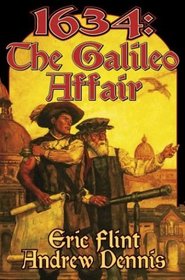Candace G. (Ogre) reviewed 1634 : The Galileo Affair (Assiti Shards, Bk 3) on + 1568 more book reviews
Good continuation of an excellent series. A small town has mysteriously vanished from contemporary America, and landed in the middle of Europe's 30 Years War. Not to mention landed right in the middle of the argument between the Holy Inquisition and the accused heretic Galileo.
Adventure continues where a West Virginia town was hurled centuries in to the past by a cosmic accident. They hope to establish the United States of Europe and bring a better standard of living to the area's inhabitants.
Peter R. (sfpete) reviewed 1634 : The Galileo Affair (Assiti Shards, Bk 3) on + 25 more book reviews
I enjoy the whole series, particularly those set in the Germanies. This sort of side trip doesn't interest me as much, but it's still a good read.
Joan W. (media-junkie) reviewed 1634 : The Galileo Affair (Assiti Shards, Bk 3) on + 23 more book reviews
More time traveling West Virginians and love at first sight. Recommend reading 1632 first.
The plot is set in alternate reality. It begins in the year 2000 with a 6-mile piece of West Virginia when people, facilities, American values and capabilities are transplanted to northern Germany in 1632. The 30 Years War is raging in Europe with alliances shifting and armies of mercenaries laying waste to the countryside in the name of one king or another, or none.
It is two years after the "transplant" and science and education for all are viewed with alarm and suspicion by the Holy Roman Empire as well as politically astute leaders. An auto de fey probably awaits Galileo, languishing in prison, unless his American advocate can make a good defense for his support of Copernicus' theories about the paths and revolutions of the Earth and the Sun.
The author uses some likable folks to make a good show of the effectiveness of ingenuity, hard work and the American way.
It is two years after the "transplant" and science and education for all are viewed with alarm and suspicion by the Holy Roman Empire as well as politically astute leaders. An auto de fey probably awaits Galileo, languishing in prison, unless his American advocate can make a good defense for his support of Copernicus' theories about the paths and revolutions of the Earth and the Sun.
The author uses some likable folks to make a good show of the effectiveness of ingenuity, hard work and the American way.
If you love the ROF series, this one has many of the main characters. If you've never read 1632, some of the storyline may be a bit difficult to follow.
Galileo fought the Catholic Church's doctrine on several fronts, which is a fact I had not known until now, so here I go on another research tangent simply because a fictionalized account intrigued me...
Galileo fought the Catholic Church's doctrine on several fronts, which is a fact I had not known until now, so here I go on another research tangent simply because a fictionalized account intrigued me...
Could not get into this book.
Tedious. The initial burst of activity, of a society having to reinvent the technology they take for granted, is gone. Instead of confrontation with warlords and dictators, of meeting the demands of business, sanitation, hygiene, medicine, government and education, our displaced-in-time team spins in place for much of the book, learning 17th century gossip and backstabbing politics, and little else. Very little happens, or is shown, but there is a huge amount of talk and lecturing. So slow and boring is it that I have no desire to read 1635 or any other sequel or similar work. Finishing the book became a chore, but thankfully, the pace picked up in the last 1/4 of the book. Most of the first three quarters could have been summarized in about three paragraphs, and had little relevance to the ending.




